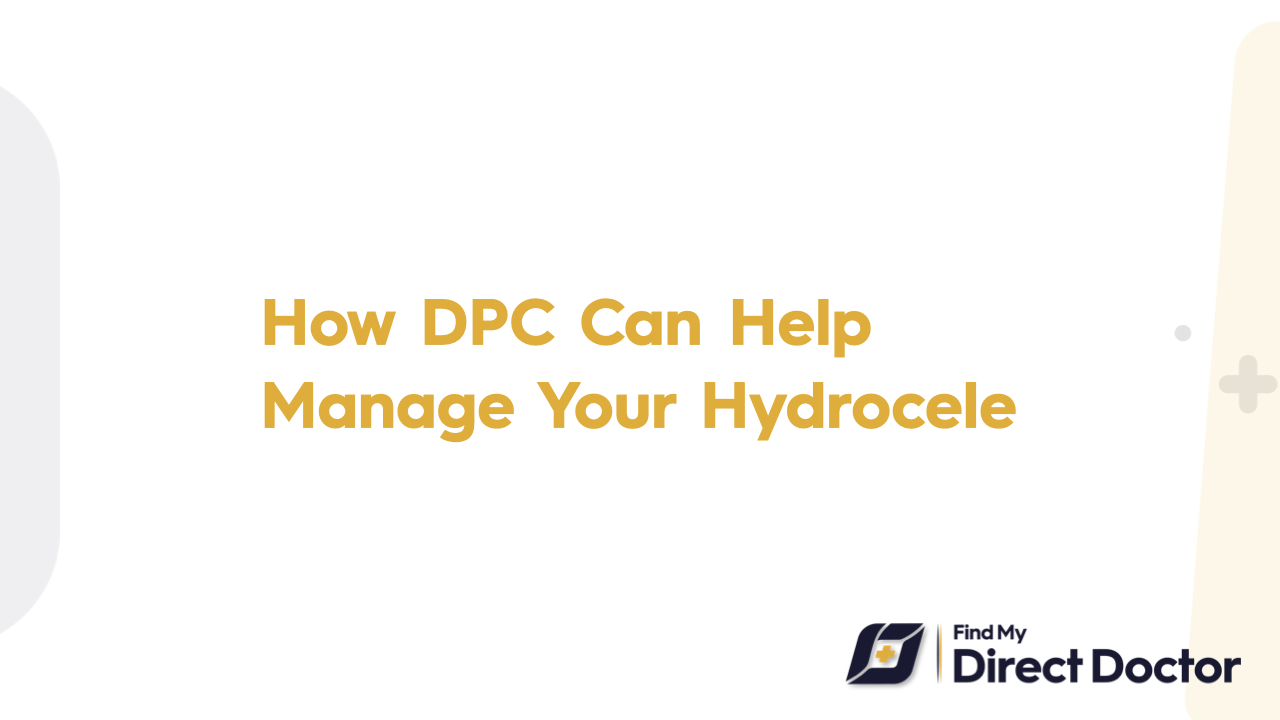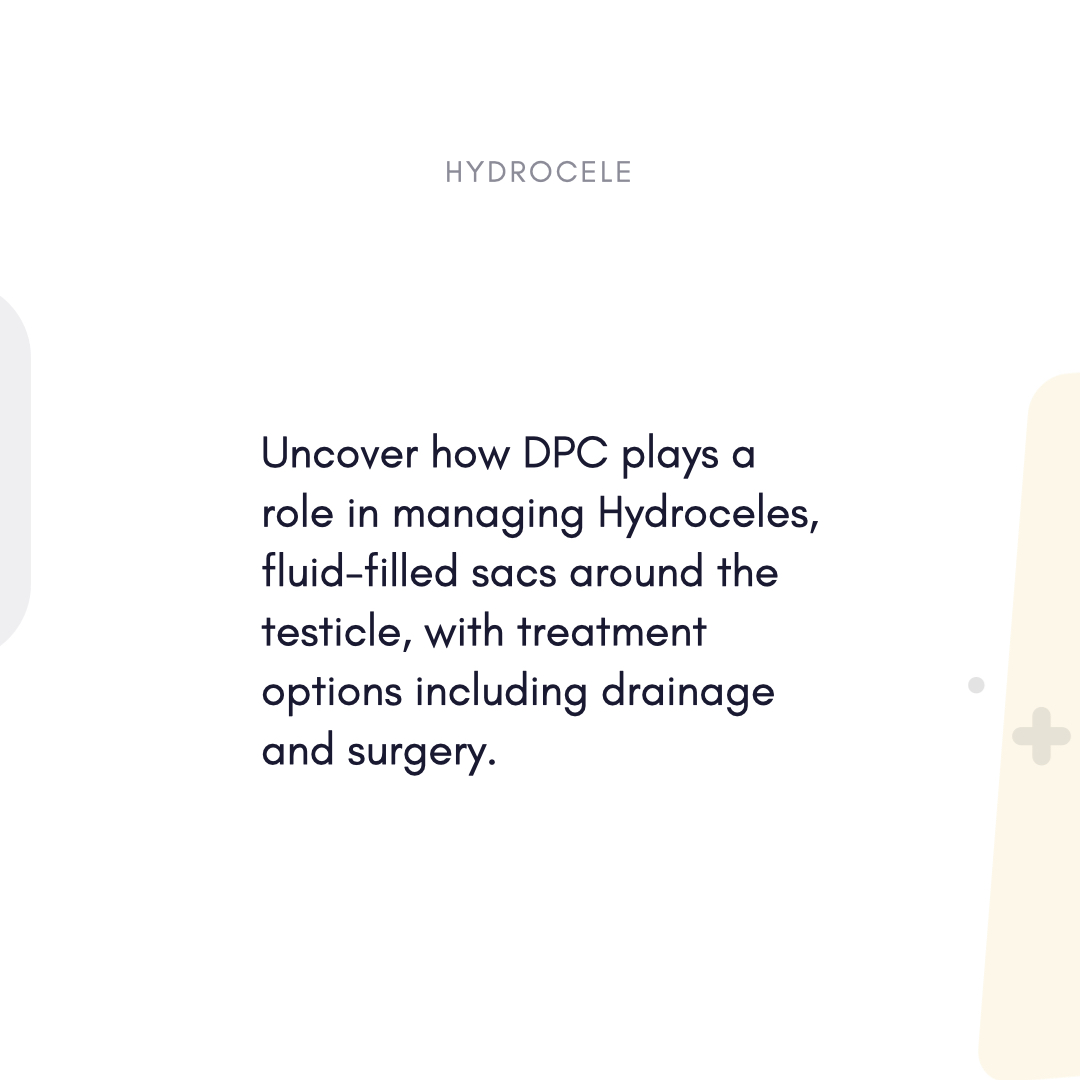Hydrocele and Direct Primary Care (DPC): Your Path to Personalized, Hassle-Free Care
Should you find a painless swelling in your scrotum, you could be dealing with a hydrocele—a fluid-filled sac around the testicle. Although common and generally benign, if left untreated hydroceles can cause pain, anxiety, or complications. While Direct Primary Care (DPC) provides a smarter approach—affordable, patient-centered care that stresses observation, education, and minimally invasive solutions—traditional healthcare may hurry you into pointless tests or surgeries. Let's see how DPC streamlines hydrocele control.

Knowing Hydrocele
When fluid collects between the parietal and visceral layers of the tunica vaginalis encircling the testis, a hydrocele results. Common in adults (from injury, infection, or inflammation) and newborns (often resolving by age 1), hydroceles are usually benign but can cause:
- Swelling: From minor to severe, maybe influencing mobility.
- Uncomfort: Scrotal aching or weight.
- Anxiety: Though hydroceles are non-cancerous, one fears either testicular cancer or infertility.
Depending on degree and patient preference, management options include watchful waiting, aspiration, sclerotherapy, or hydrocelectomy—surgery.
DPC Transforms: Managing Hydrocele
Under the membership approach known as Direct Primary Care (DPC), patients pay a monthly fee—usually USD 50–USD 150—for unlimited access to their doctor. This means for hydrocele sufferers no hurried diagnosis, no surprise bills, and treatment catered to your comfort and goals.
Customized Service Based on Experience
Following American Urological Association (AUA) recommendations, DPC doctors provide:
- Precise diagnosis: Discounted ultrasounds and physical tests help distinguish varicoceles from hernias, tumors, or hydroceles.
- Customized treatment plans: Talking about advantages and disadvantages of choices including:
- Conservative governance: Tracking minor asymptomatic cases.
- For a few patients, minimally invasive treatments include sclerotherapy or aspiration.
- If necessary, seamless referrals to urologists for hydrocelectomy under surgical coordination.
- Complete follow-up: After surgery, treat to stop recurrence or infection.
Cost-Effective, Transparent Treatment
Wholesale-priced imaging helps DPC clinics cut expenses:
- Ultrasounds for a fraction of conventional prices at partner facilities.
- There are no covert fees. Open pricing for consultations, tests, or in-office treatments.
- Economical plans: Giving non-surgical choices—such as aspiration—top priority before surgery.
Continuous Support for Mental Wellness
Having 24-hour access to your doctor allows you to:
- Quickly discuss changes in size or discomfort.
- Review imaging results without waiting for a callback several weeks away.
- Share honestly your worries about cancer risks or fertility.
Customized Hydrocele Management at DPC
DPC customizes treatment for your needs, regardless of your age—that of an adult or a parent of an infant:
- Pediatric emphasis: Helping parents through careful waiting and monthly visits to monitor natural resolution.
- Adult monitoring: Tracking symptom changes and recommending lifestyle changes including supportive underwear.
- Coordinating urologists helps to guarantee seamless recovery following hydrocelectomy.
Real-Life Success Stories
- Case 1: James, 28, developed scrotal swelling following a gym injury. His DPC doctor advised observation after ruling out a hernia by ultrasonic scan and diagnosis of a hydrocele. The fluid cleared on its own within three months—no surgery required.
- Case 2: Mrs. Lee's newborn son had a big hydrocele. His DPC doctor tracked it monthly, reassured her about natural resolution, and linked her with a pediatric urologist should it continue. After 11 months, the hydrocele cleared without requiring surgery.
Frequently Asked Questions: DPC and Hydrocele
- Q: When might a hydrocele call for surgery?
A: Only if it's severe, uncomfortable, or lasts more than one year—in newborns. DPC lets you steer clear of pointless surgeries.
- Q: Is DPC reasonably priced for treatment of a hydrocele?
A: Sure! Most cut on imaging, specialist co-pays, and ER visits. Usually, memberships are less than those of a gym membership.
- Q: What should I do if I need a urologist?
A: Your DPC doctor guarantees open contact with experts and arranges referrals.
Why DPC Helps Hydrocele Patients Win
DPC follows AUA policies to provide:
- Monitoring wisely: Steer clear of overtreatment for benign hydroceles.
- Same-day tests and discounted imaging help with anxiety.
- Transparency on costs: Clearly marked ultrasounds or specialist visit rates.
- Time to clarify choices such as aspiration against surgery so that informed decisions may result.
Take Control of Your Hydrocele Right Now
One does not have to be stressed over a hydrocele. DPC helps you find a partner who combines medical knowledge with compassionate direction to help you make wise decisions free from bureaucratic or financial complications.






